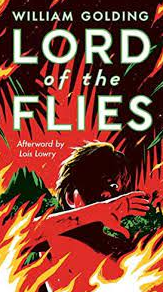“Lord of the Flies” by William Golding
Weekly book critiques and reviews.

Bestselling and most recognizable cover of William Golding’s “Lord of the Flies.”
January 23, 2023
Most likely, you’ve already heard of the famous Penguin Publishing classic “Lord of the Flies,” written by William Golding. This is because so many times over, it has been assigned in hundreds of different English classes across the country to be dissected again and again. Not only this – the book has been highly rated by millions for nearly 70 years, and counting.
Personally, I had the luxury of being in one of said classes assigned to this book; and the great thing is, I have the ability to write about how, as a student, I felt about it.
If I’m going to be completely honest, as I always try to be, I very much struggled to get into it at the start. At first it felt a bit slow, and very hard to get into throughout chapters one and two. This was really only because it begins with a lot of detail, discussing backstories of the boys, and is the main set up to how the rest of the story will go on.
As I continued to read though, many of the different underlying messages portrayed in “Lord of the Flies” slowly became clearer and clearer, and I found myself at the edge of my seat by the end.
Now to preface this, the reading level is around a middle school level, so it’s not difficult to read. Despite this, some themes throughout tend to be gorey and slightly traumatic. If that sort of thing is not for you, then I’d skip this book if that is possible. If not, just be warned, it gets weird.
Other than that, “Lord of the Flies” distinctly dissects the very thin line between humanity and savagery, diving deep into the relationship between order and chaos among ungoverned boys. This is done by drawing a road between the innocence of childhood to the inevitable “darkness of a man’s heart” as Golding puts it.
It begins with the downing of a plane filled with young boys on a deserted island, and goes through the storyline of actions taken without adults.
I personally believe it is a wonderful critique on the actions of men who aren’t herded by anyone else. It strongly supports the idea that humans cling to a higher power, whether that be a god, a leader, or someone who just seems like they know what they’re doing. As well as this, it shows how, when a crown is placed upon the wrong head, it can lead to severe consequences.
In the end, although I struggled with the start of it, “Lord of the Flies” is a genuinely good book. It leans into the complexity of emotion, and the intricate reasoning behind actions and reactions to high stress and high pressure situations.


